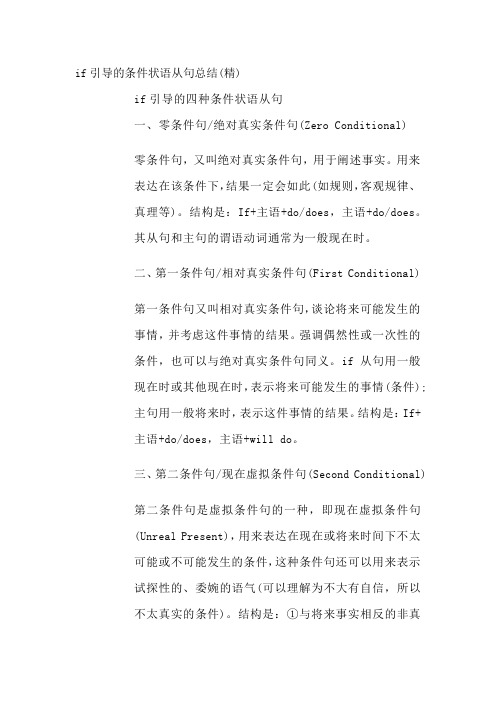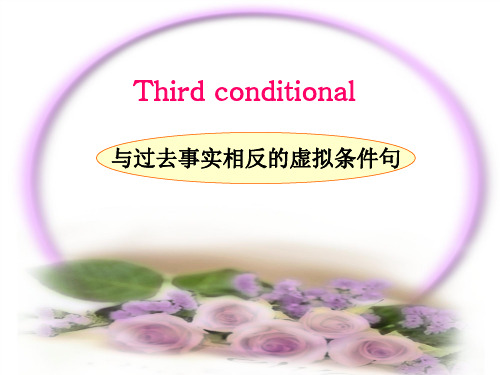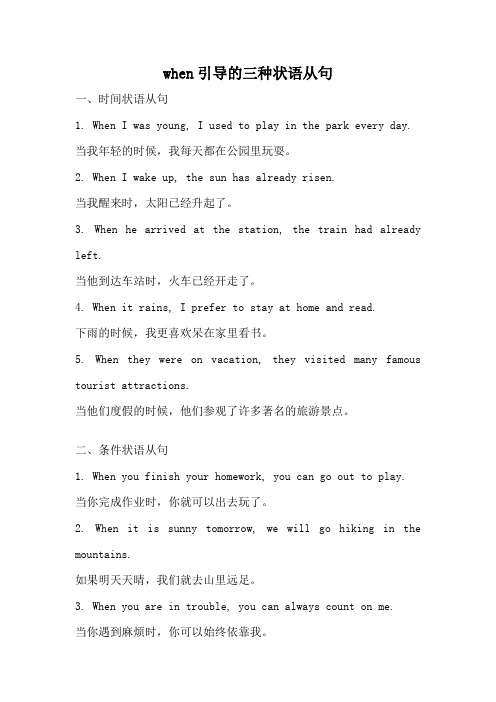第三条件状语从句
条件状语从句的四种类型解析

条件状语从句的四种类型解析条件状语从句是英语语法中常见的一种从句类型,用于表示一个条件或假设。
它可以通过四种不同的方式来表达,在文章中起着重要的作用。
本文将对这四种类型进行详细解析。
第一种类型:真实条件状语从句真实条件状语从句用来表示一个可能发生的条件和其结果。
它的结构是“if + 陈述句,陈述句”。
该类型的状语从句使用的是一种常见、普遍的条件句结构。
例如:If it rains, we will stay at home.(如果下雨,我们会呆在家里。
)If I have time, I will go to the library.(如果我有时间,我会去图书馆。
)这种类型的状语从句所表达的条件通常是可能实现的,所以它与现实情况相符。
第二种类型:虚拟条件状语从句虚拟条件状语从句用来表示一个假设性的条件和其结果。
它的结构是“if + 过去式,would/could/might + 动词原形”。
该类型的状语从句常用于表达不太可能实现的条件。
例如:If I were rich, I would travel around the world.(如果我富有,我会周游世界。
)If he had studied harder, he could have passed the exam.(如果他努力学习,他本可以通过考试。
)在这种类型的状语从句中,主句通常包含一个虚拟语气的动词,表示对现实情况的一种想象或假设。
第三种类型:反过来的条件状语从句反过来的条件状语从句用来表示一个反向的条件和其结果。
它的结构是“had/should + 陈述句,would/could/might + 动词原形”。
该类型的状语从句常用于反向的条件假设。
例如:Had it not been for your help, I would have failed.(如果不是你的帮助,我就会失败。
)Should you need any assistance, feel free to contact me.(如果你需要任何帮助,随时联系我。
第三条件状语从句

( ). 选择 答 : D 1. If you _____ home last night, you would have watched the exciting football match. A. stayed B. was staying C. would stay D. had stayed A 2. If you ______ so careless, you wouldn't have broken the laptop computer. hadn't been B. weren't C. isn't D. wouldn't be C 3. ______ you helped me, I wouldn't have made so much progress in my work. Didn't B. Wouldn't C. Hadn't D. Couldn't
( _____________ (listen) to me, you had listened would not have made ____________________ (not make) that mistake. hadn't climbed 2. If the boy _______________ (not climb) the tree wouldn't have broken yesterday, he _________________ (not break) his leg. had come 3. If you __________ (come) to the class in time this wouldn't have been morning, the teacher __________ (not be ) so angry. 4. If we _________ (meet) each other the other day, I had met would have had heart-to________________ (have) a heart-to-heart talk with you. had been 5. If you ___________ (be) there yesterday, you would have seen ________________(see) the famous movie star.
if引导的条件状语从句总结(精)

if引导的条件状语从句总结(精)if引导的四种条件状语从句一、零条件句/绝对真实条件句(Zero Conditional)零条件句,又叫绝对真实条件句,用于阐述事实。
用来表达在该条件下,结果一定会如此(如规则,客观规律、真理等)。
结构是:If+主语+do/does,主语+do/does。
其从句和主句的谓语动词通常为一般现在时。
二、第一条件句/相对真实条件句(First Conditional)第一条件句又叫相对真实条件句,谈论将来可能发生的事情,并考虑这件事情的结果。
强调偶然性或一次性的条件,也可以与绝对真实条件句同义。
if从句用一般现在时或其他现在时,表示将来可能发生的事情(条件);主句用一般将来时,表示这件事情的结果。
结构是:If+主语+do/does,主语+will do。
三、第二条件句/现在虚拟条件句(Second Conditional)第二条件句是虚拟条件句的一种,即现在虚拟条件句(Unreal Present),用来表达在现在或将来时间下不太可能或不可能发生的条件,这种条件句还可以用来表示试探性的、委婉的语气(可以理解为不大有自信,所以不太真实的条件)。
结构是:①与将来事实相反的非真实条件句是If+主语+should do/were to do/did,主语+would/should/could/might do;②与现在事实相反的非真实条件句是If+主语+did,主语+would/should/could/might+do。
四、第三条件句/过去虚拟条件句(Third Conditional) 第三条件句是表示与过去事实相反的虚拟语气,是用来表达如果(If)当时那样发生,另外一方面(当时)结果会如何。
通常是指过去的事情,带有一切已经太迟而不能够补救的意思。
结构是:If+主语+had done,主语+would/should/could/ might+have done。
if 条件句的时态搭配1.if从句用一般现在时,主句用一般将来时2.if从句用一般现在时,主句用may/might/canIf the fog gets thicker the plane may/might be diverted.3.if从句用一般现在时,主句用must/shouldIf you want to lose weight you must/should eat less bread.4.if从句用一般现在时,主句用一般现在时5.if从句用现在进行时,主句用一般将来时6.if从句用现在完成时,主句用一般将来时If you have finished dinner I’ll ask the waiter for the bill.。
第三条件状语从句

*注意:3. 主句或从句中的谓语动词构成否定式的时候, 应分别在主句中的would的后面或if从句中的had 的 后面加上not. had not done would not have done If sb. + _____________ , sb. ___________ ___________ + third form of the verb. 如果昨天晚上没有去看电影的话,你就完成了那份报告了。 If you had not gone to the cinema last night, you would have finished the report. 如果你告诉过我, 我就不会浪费那么多时间。 If you had told me that, I would not have wasted so much time. *注意:4. if 有时可以省略,但if后面部分需改为倒装句语序. Had you told me that, I would not have wasted so much time.
(二). 选择正确的答案: D 1. If you _____ home last night, you would have watched the exciting football match. A. stayed B. was staying C. would stay D. had stayed A 2. If you ______ so careless, you wouldn’t have broken the laptop computer. • hadn’t been B. weren’t C. isn’t D. wouldn’t be C 3. ______ you helped me, I wouldn’t have made so much progress in my work. • Didn’t B. Wouldn’t C. Hadn’t D. Couldn’t
条件状语从句的归纳总结

条件状语从句的归纳总结条件状语从句是英语中重要且常用的一种从句类型,它用于表示某个动作或情况发生的前提条件。
在句子中,条件状语从句通常由指示条件的连词引导,如:if(如果)、unless(除非)、provided that(倘若)、as long as(只要)等。
本文将对条件状语从句进行归纳总结,并提供常见的应用实例。
一、以if引导的条件状语从句1. 表示真实条件“如果”某个条件成立,就会发生某个结果。
例句1: If it rains tomorrow, we will stay at home.(如果明天下雨,我们会待在家里。
)例句2: If you study hard, you will pass the exam.(如果你努力学习,你会通过考试。
)2. 表示与现在或将来相反的假设“如果”某个条件成立,但事实上并不成立。
例句1: If I were you, I would apologize to her.(如果我是你,我会向她道歉。
)例句2: If I had enough money, I would buy a new car.(如果我有足够的钱,我会买一辆新车。
)3. 表示过去某个假设的结果“如果”过去某个条件成立,就会有相应的结果。
例句: If he had studied harder, he would have passed the exam.(如果他当时学得更努力,他就会通过考试。
)二、以unless引导的条件状语从句unless的意思是“除非”,用于表示某个条件不成立时才会发生某个结果。
例句1: We won't go shopping unless it stops raining.(除非停止下雨,否则我们不会去购物。
)例句2: You won't lose weight unless you exercise regularly.(除非你定期锻炼,否则你无法减肥。
when引导的三种状语从句

when引导的三种状语从句一、时间状语从句1. When I was young, I used to play in the park every day.当我年轻的时候,我每天都在公园里玩耍。
2. When I wake up, the sun has already risen.当我醒来时,太阳已经升起了。
3. When he arrived at the station, the train had already left.当他到达车站时,火车已经开走了。
4. When it rains, I prefer to stay at home and read.下雨的时候,我更喜欢呆在家里看书。
5. When they were on vacation, they visited many famous tourist attractions.当他们度假的时候,他们参观了许多著名的旅游景点。
二、条件状语从句1. When you finish your homework, you can go out to play.当你完成作业时,你就可以出去玩了。
2. When it is sunny tomorrow, we will go hiking in the mountains.如果明天天晴,我们就去山里远足。
3. When you are in trouble, you can always count on me.当你遇到麻烦时,你可以始终依靠我。
4. When it rains heavily, we have to stay indoors.当下大雨时,我们不得不呆在室内。
5. When you have time, please call me.当你有时间的时候,请给我打电话。
三、原因状语从句1. When the weather is hot, people like to eat ice cream to cool down.当天气炎热时,人们喜欢吃冰淇淋来降温。
032第三条件从句

第三条件从句本课中我们将学习有关第三条件句。
我们将学习如何使用及如何和其他两种条件句的区别。
第一和第二条件从句注重可能的将来条件。
使用第三条件从句谈论过去情况。
我们用作非正事实的过去情况或想象中的情况,换句话说某情况和结果并没有发生。
看以下的句子:If John had driven more carefully, he wouldn't have had this accident. John小心开车了吗?没有John遇到了交通意外了吗?是的象第一和第二条件从句,第三条件从句包括两个部分:▪'if'从句(条件)▪一个结果从句(结果或作用)使用第三从句,然而,结果已经不可能发生,并且不可能改变结果。
我们谈论过去的情况及过去的结果。
例如If I hadn't gone out last night (不真实的过去情况), I wouldn't have been tired this morning (不可能的过去结果。
象第一和第二条件从句,第三条件从句包括两个部分:▪'if'从句(条件)▪一个结果从句(结果或作用)使用第三从句,然而,结果已经不可能发生,并且不可能改变结果。
我们谈论过去的情况及过去的结果。
例如If I hadn't gone out last night (不真实的过去情况), I wouldn't have been tired this morning (不可能的过去结果。
第三条件从句是不真实的,因为它现在太迟了结果已经不可能发生了。
第三条件从句常常用来回顾并表达某种遗憾:我应该这么做的但是不幸的是我没有这么做。
在大多数的第三条件从句中,结果是非常明显的。
我们可以省去结果从句只是表达我们的遗憾,以'If only'或 'I wish'开始。
例如If only I'd studied for the exam…(如果事先准备考试的话我就不会不及格了。
用if引导的条件状语从句15个

用if引导的条件状语从句15个如果引导的条件状语从句是英语语法中非常常见的句型,用于表达某种条件下发生的情况。
下面将介绍15个以if引导的条件状语从句的相关内容。
1. **Zero Conditional**Zero conditional用于表达普遍真理或习惯性的动作,结构为if + 现在时,现在时。
例如:If you heat water to 100 degrees, it boils.2. **First Conditional**First conditional用于表达将来可能发生的事情,结构为if + 现在时,将来时。
例如:If it rains tomorrow, we will stay indoors.3. **Second Conditional**Second conditional用于表达与现在事实相反的假设,结构为if + 过去时,would/could/might + 原形动词。
例如:If I were rich, I would travel around the world.4. **Third Conditional**Third conditional用于表达与过去事实相反的假设,结构为if + 过去完成时,would/could/might + have + 过去分词。
例如:If I had studied harder, I would have passed the exam.5. **Mixed Conditional**Mixed conditional结合了第二和第三条件句的结构,用于表达过去的假设对现在的影响,或现在的假设对过去的影响。
例如:If I had known you were coming, I would have baked a cake.6. **Unless**Unless的意思是“除非”,引导的条件状语从句表示否定条件。
结构为unless + 句子,相当于if not。
- 1、下载文档前请自行甄别文档内容的完整性,平台不提供额外的编辑、内容补充、找答案等附加服务。
- 2、"仅部分预览"的文档,不可在线预览部分如存在完整性等问题,可反馈申请退款(可完整预览的文档不适用该条件!)。
- 3、如文档侵犯您的权益,请联系客服反馈,我们会尽快为您处理(人工客服工作时间:9:00-18:30)。
8
Look at the sentence from the interview and answer the questions.
If I had wanted to see my grandchildren, I would have had to visit them in person.
a)What time is Grandma Chen talking about: past, present or future? past b) What happened: Did she travel to see them? No! The pattern of the Third Conditional. have done would ___________ done , sb. ________ If sb. + had _________ could might
1. If the weather is good, we will go out tomorrow. If从句:一般现在时,主句:将来时 2. If I were you, I would study hard. 条件从句为:If +主语+动词过去式; 主句为:主语+ would/should+ 动词原形 3. If you heat the ice, it turns to water. If从句:一般现在时,主句:一般现在时
wouldn’t have broken yesterday, he _________________ (not break) his leg. had come (come) to the class in time this 3. If you __________ wouldn’t have been morning, the teacher __________ (not be ) so angry.
*注意:3. 主句或从句中的谓语动词构成否定式的时候, 应分别在主句中的would的后面或if从句中的had 的 后面加上not. had not done , sb. ___________ would not ___________. have done If sb. + _____________ 如果昨天晚上没有去看电影的话,你就完成了那份报告了。 If you had not gone to the cinema last night, you would have finished the report. 如果你告诉过我, 我就不会浪费那么多时间。 If you had told me that, I would not have wasted so much time. *注意:4. if 有时可以省略,但if后面部分需改为倒装句语序. Had you told me that, I would not have wasted so much time.
(一)用所给动词的适当形式填空:
1. If you _____________ had listened (listen) to me, you would not have made (not make) that mistake. ____________________ hadn’t climbed (not climb) the tree 2. If the boy _______________
article. Find and underline them in the text. 1.If you don’t want to fall behind in today’s competitive job market, you have to commit yourself to life-long learning.
4. Third conditional
与过去事实相反的虚拟条件句
虚拟语气从句用在与过去事实相反的条件句中,条件句中 的谓语用had+过去分词,结果主句的谓语用would+have+ 过去分词: 如果我早点离开,我就赶上公共汽车了。 If I had left earlier, I would should have caught the bus. 如果我想起了那件事,我是会向母亲谈及的。 If I had thought of it, I would should have talked to mother. *注意:1. 不可将If从句中的谓语动词所用的形式误认为过 去完成时,它仅是虚拟语气的一种表达形式. 2. 在主句中, 若主语是第一人称,也可用should have+ 过去分词构成谓语.
4. If we _________ had met (meet) each other the other day, I would have had (have) a heart-to-heart talk with ________________
you. had been (be) there yesterday, you 5. If you ___________ would have seen ________________(see) the famous movie star.
1 First conditional: 真实从句, 条件有可能实现的 2 Second conditional: 非真实从句, 不可能实现的,
与现在事实相反 3 Zero conditional: 零条件从句,客观事实,有先后次序
5 There are three conditional sentences in this
2. If you invest time in developing your study skills now, you’ll be enjoying the rewards for rest of your life.
3.If I were you, I would ask the teacher.
